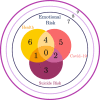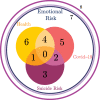An integer programming model to assign patients based on mental health impact for tele-psychotherapy intervention during the Covid-19 emergency
- PMID: 33839993
- PMCID: PMC8036244
- DOI: 10.1007/s10729-020-09543-z
An integer programming model to assign patients based on mental health impact for tele-psychotherapy intervention during the Covid-19 emergency
Abstract
The Covid-19 pandemic challenges healthcare systems worldwide while severely impacting mental health. As a result, the rising demand for psychological assistance during crisis times requires early and effective intervention. This contributes to the well-being of the public and front-line workers and prevents mental health disorders. Many countries are offering diverse and accessible services of tele-psychological intervention; Ecuador is not the exception. The present study combines statistical analyses and discrete optimization techniques to solve the problem of assigning patients to therapists for crisis intervention with a single tele-psychotherapy session. The statistical analyses showed that professionals and healthcare workers in contact with Covid-19 patients or with a confirmed diagnosis had a significant relationship with suicide risk, sadness, experiential avoidance, and perception of severity. Moreover, some Covid-19-related variables were found to be predictors of sadness and suicide risk as unveiled via path analysis. This allowed categorizing patients according to their screening and grouping therapists according to their qualifications. With this stratification, a multi-periodic optimization model and a heuristic are proposed to find an adequate assignment of patients to therapists over time. The integer programming model was validated with real-world data, and its results were applied in a volunteer program in Ecuador.
Keywords: AAQ-II; Integer programming; Logistic regression; SARS–CoV2; Tele-psychotherapy; WLSMV.
Conflict of interest statement
The authors declare that they have no conflict of interest.
Figures





Similar articles
-
Factors associated with psychiatric adverse effects in healthcare personnel during the COVID-19 pandemic in Ecuador.Rev Colomb Psiquiatr (Engl Ed). 2021 Jul-Sep;50(3):166-175. doi: 10.1016/j.rcpeng.2020.12.001. Epub 2021 Aug 10. Rev Colomb Psiquiatr (Engl Ed). 2021. PMID: 34481796 Free PMC article.
-
"When the first session may be the last!": A case report of the implementation of "rapid tele-psychotherapy" with single-session music therapy in the COVID-19 outbreak.Palliat Support Care. 2022 Apr;20(2):290-295. doi: 10.1017/S1478951521001425. Palliat Support Care. 2022. PMID: 34399867 Free PMC article.
-
Patients' experiences with tele-mental health services during COVID-19 in Pakistan.East Mediterr Health J. 2024 May 14;30(4):283-291. doi: 10.26719/2024.30.4.283. East Mediterr Health J. 2024. PMID: 38808404
-
Mental health services for infectious disease outbreaks including COVID-19: a rapid systematic review.Psychol Med. 2020 Nov;50(15):2498-2513. doi: 10.1017/S0033291720003888. Epub 2020 Nov 5. Psychol Med. 2020. PMID: 33148347 Free PMC article.
-
Feasibility and preliminary efficacy of brief tele-psychotherapy for COVID-19 patients and their first-degree relatives.J Affect Disord. 2023 Jun 1;330:300-308. doi: 10.1016/j.jad.2023.03.024. Epub 2023 Mar 17. J Affect Disord. 2023. PMID: 36934855 Free PMC article. Review.
Cited by
-
Introduction to the special issue: Management Science in the Fight Against Covid-19.Health Care Manag Sci. 2021 Jun;24(2):251-252. doi: 10.1007/s10729-021-09569-x. Epub 2021 Jun 15. Health Care Manag Sci. 2021. PMID: 34129134 Free PMC article. No abstract available.
-
Allocation of emergency medical resources for epidemic diseases considering the heterogeneity of epidemic areas.Front Public Health. 2023 Feb 24;11:992197. doi: 10.3389/fpubh.2023.992197. eCollection 2023. Front Public Health. 2023. PMID: 36908482 Free PMC article.
References
-
- Ahmadi-Javid A, Jalali Z, Klassen KJ. Outpatient appointment systems in healthcare: a review of optimization studies. Eur J Oper Res. 2017;258(1):3–34.
-
- Aiken L, Clarke S, Sloane D, Sochalski J, Silber J. Hospital nurse staffing and patient mortality, nurse burnout, and job dissatisfaction. JAMA J Am Med Assoc. 2001;288:1987–93. - PubMed
-
- Alzugaray C, García FE, Reyes A, Alvarez R. Propiedades psicométricas de una versión breve de la escala de ruminación relacionada a un evento en población chilena afectada por eventos altamente estresantes. Ajayu Órgano de Difución Cintífica del Departamento de Psicología de la Universidad Católica Boliviana “San Pablo”. 2015;3(2):183–198.
-
- Arias PR, Barraca J (2020) Propiedades Psicométricas del Cuestionario de Aceptación y Acción - II, La Evitación Experiencial en Población Ecuatoriana. Revista CES Psicología (Pre-print)
MeSH terms
LinkOut - more resources
Full Text Sources
Other Literature Sources
Medical
Research Materials
Miscellaneous

